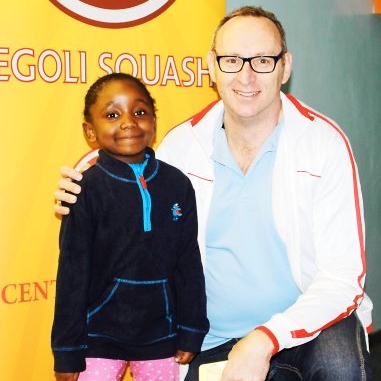
News

A chance chat created Egoli Squash and impacted the lives of 5 000
JACK MILNER
In fact, the love was passed on right at the beginning to Dikana Mthombeni, who this year went to the Maccabi Games as the South African squash coach.
The original idea was devised primarily by squash enthusiast Glenn Lazarus, in chatting to his squash opponent, Lawrence Dlamini. They discussed the idea of holding some sort of squash clinic in Soweto, where they would try and create interest in the sport. About six years ago, they then found a facility and put it together.
“We had a good response but, at the time, we looked at the event as a once-off,” he said. “But as time went on we were asked when we would hold another squash day,” Lazarus said.
Lazarus had been a committed player for many years and was chairman of Wits Squash Club. His love grew from his childhood. “We had friends who had a court at their house and that is how I started playing. It was a game I enjoyed and it was also a sport you can play whether the sun is out or when it’s pouring with rain.”
He continued his involvement in administration with Central Gauteng and Squash SA, but he felt the development of the sport had stagnated. This was his way of reigniting the flame.
“With the success of our first event, Lawrence and I decided to expand the concept. I was challenged by Central Gauteng as to whether we could make a success of the programme.”
And so Egoli Squash was born.
Lazarus got together a group of squash players who went into townships and inner-city areas to find courts they could use. The goal of the programme is to engage kids from previously disadvantaged communities in an experience that incorporates squash, fitness, tutoring, community service and mentoring, in order to change children’s lives for the better.
Egoli Squash is now a registered public benefit outreach programme of Central Gauteng Squash, which uses the sport to combat poverty and crime for disadvantaged youth aged eight to 18, from the communities of Alexandra, Soweto and the Johannesburg inner city.
“We soon realised we were changing lives. A couple of the youngsters have become top players. We have been able to get them off the streets away from the gangs and so-called friends with whom they sniff glue.”
As the programme progressed and a number of these players started to improve and compete at a higher level, Lazarus realised they needed to look beyond sport. “We attempt to teach the youngsters to approach a match in a professional way. We don’t want them to play competitions with hand-me-downs and outdated equipment and clothing.
“We want them to look professional when they come on court. The problem is that their parents don’t always have the time or means to help in that regard. The family is just worrying about how to put food on the table for their children, not how the kid prepares for a squash match.
“As a result, there was clearly a need to look beyond the sport of squash, although it is still at the centre of the programme, and we have also introduced other lifestyle concepts. For example, we have an entrepreneurial programme in which we set up six women to sew. We gave them orders to make various items such as dolls and the idea is to get them to make a living.”
Leading squash players like Craig van der Wath, presently one of the best in the world, supports the programme. Last year Van der Wath became the first player to win six career titles at the World Masters. Van der Wath, who runs the Parkview Squash Club in Johannesburg, regularly coaches some of the Egoli Squash youngsters.
Current world No 16, South African Stephen Coppinger, is another regular Egoli Squash coaches, when he is in the country.
The programme has received amazing accolades. Last year it won the SA Sports Award as the Recreation Programme of the Year and Egoli Squash is now a member of the international Laureus Sport For Good Foundation.
“We have been invited to go to Mauritius to attend their Ambassadors’ Programme,” said Lazarus.
But undoubtedly one of their biggest success stories is Mthombeni, who is now an integral part of their coaching programme. He has been the programme’s squash coach for a few years and has been pioneering the way to deal with hundreds of kids who attend training session while having only two courts to play on.
While most coaches deal with a few kids at a time or a group, Mthombeni deals with 30 to 40 on a court at a time while running fitness and other session both on the court and outside. Hiw work with Egoli Squash led to his being selected as the coach for Maccabi.




